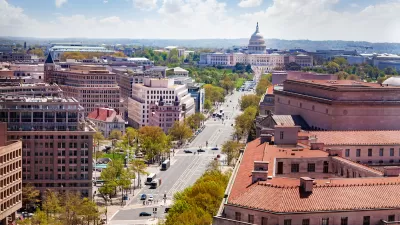The potential of a standard, easily accessible data set tracking building and land use permits could completely change the way the public interacts with changes in their community.
Emily Badger writes about a wave of tech innovations that will democratize access to information about development projects:
"Imagine if you had a location-aware app that could call up the details of a construction site as easily as Redfin can show you the nearest for-sale home….. Imagine if Zillow could tell you that cute add-on to the row home you like was never inspected by the city. Or if economists could use remodeling permits to forecasts gentrification while it was still possible to help long-time residents stay in their homes."
As Badger reports, a partnership between Zillow, Accella, and other partners (including local governments in Tampa, San Diego, and Chattanooga), is working toward realizing those possibilities by developing "a common standard all cities can use to publish data about building and construction permits." The website for the standard, known as BLDS, provides more details about the current partners, and their progress, on the project.
Such a standardized data has multiple potential applications—all with the ability "to change how consumers, researchers and cities themselves understand the built world around us," according to Badger.
Modeling that potential in a specific development market, Seattle recently launched a platform to track real-estate projects. For a company like Zillow to provide a platform, however, it would require more cities to come on board.
FULL STORY: How to predict rising home prices, neighborhood change and gentrification

Alabama: Trump Terminates Settlements for Black Communities Harmed By Raw Sewage
Trump deemed the landmark civil rights agreement “illegal DEI and environmental justice policy.”

Study: Maui’s Plan to Convert Vacation Rentals to Long-Term Housing Could Cause Nearly $1 Billion Economic Loss
The plan would reduce visitor accommodation by 25% resulting in 1,900 jobs lost.

Why Should We Subsidize Public Transportation?
Many public transit agencies face financial stress due to rising costs, declining fare revenue, and declining subsidies. Transit advocates must provide a strong business case for increasing public transit funding.

Wind Energy on the Rise Despite Federal Policy Reversal
The Trump administration is revoking federal support for renewable energy, but demand for new projects continues unabated.

Passengers Flock to Caltrain After Electrification
The new electric trains are running faster and more reliably, leading to strong ridership growth on the Bay Area rail system.

Texas Churches Rally Behind ‘Yes in God’s Back Yard’ Legislation
Religious leaders want the state to reduce zoning regulations to streamline leasing church-owned land to housing developers.
Urban Design for Planners 1: Software Tools
This six-course series explores essential urban design concepts using open source software and equips planners with the tools they need to participate fully in the urban design process.
Planning for Universal Design
Learn the tools for implementing Universal Design in planning regulations.
Caltrans
Smith Gee Studio
Institute for Housing and Urban Development Studies (IHS)
City of Grandview
Harvard GSD Executive Education
Toledo-Lucas County Plan Commissions
Salt Lake City
NYU Wagner Graduate School of Public Service





























